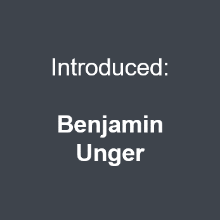On 1st November, Benjamin Unger started to work for SimTech: A good opportunity to introduce him a bit more.
Maybe you can introduce yourself briefly. Where do you come from? What have you done so far?
I am from Tettnang in the Lake Constance region and thus originally from Baden-Württemberg. I studied Mathematics at the Karlsruhe Institute of Technology and the Virginia Polytechnic Institute and State University. After a short excursion into the business world (internships at Allianz Deutschland AG and Robert Bosch GmbH), I moved to Berlin to write my doctoral thesis in the field of Applied Mathematics in the research group of Prof. Mehrmann at Technische Universität Berlin.
What are your focuses and in which direction have you done research so far?
I work in three different fields of research: In the context of my dissertation, I have focused on time-delayed differential-algebraic equations and have mainly proved existential and unambiguous results. My second research focus is model reduction, i.e. the approximation of high-dimensional differential equations by low-dimensional or quickly evaluated substitute models. My third field of research, on which I have been working since the end of last year, is port-Hamiltonian systems. This is an energy-based modeling approach, the goal of which is, in simple terms, to describe physics as accurately as possible on the one hand and to present the resulting models in a form suitable for mathematics on the other.
What are your plans and goals as a junior research group leader?
I would like to take the great opportunity offered by the position as an independent junior research group leader to establish my own, internationally recognized research group that is at the same time firmly rooted in the region. The interdisciplinary orientation of SimTech offers many exciting cooperation possibilities that hopefully will lead to further research proposals. I am also looking forward to contribute to the graduate school with lectures and seminars. So there is a lot to do in the next four years, which I am looking forward to!
Which will be the main topics?
My research will focus on generating physically interpretable models from data, or enriching or calibrating existing models with data in a physically meaningful way. In many complex systems, this is not just a single model, but a whole library of models that can interact with each other via a network structure. It is important that even the coupled models do not exhibit unphysical behavior, such as the generation of energy. My research will cover the complete process chain from model building to efficient approximation in time and space. Overall, I hope to create important contributions for the development of digital images, so-called digital twins.
What do you expect from the cooperation within and with SimTech?
Due to the interdisciplinary orientation of SimTech I am looking forward to get to know many new applications and to open up new topics for me through the cooperation. The position as a junior research group leader is very suitable to concentrate on my research and the supervision of future PhD students. At the same time, SimTech gives me the opportunity to be involved in teaching and thus to lay the foundation for my further scientific career.
Why did you decide on the University of Stuttgart and SimTech?
What I like about SimTech is the interdisciplinary concept and the Focus Challenges. From the project-specific (as opposed to the discipline-specific) approach, I hope to gain new impulses for my research. The proximity to the Cyber Valley and the industry offers the possibility to implement research results in real projects.
Do you have any open positions to fill?
I have not yet advertised any positions, but this will happen in the first 1-2 months. Candidates should have a solid basic knowledge of (applied) mathematics and be interested in interdisciplinary issues. Previous knowledge in the fields of numerical analysis, model reduction or control theory is a promising addition, but is by no means necessary. Applicants can look forward to an exciting field of research with international cooperation opportunities. A good supervision that allows for self-determined research is a matter of course for me.
Will you offer seminars or lectures in the winter semester?
I will use the winter semester for the first time to arrive in Stuttgart and especially in SimTech, get to know the new colleagues, write research proposals and publish first results. But from the summer semester on I definitely want to offer lectures and seminars on my research topics. Especially in the field of energy-based modeling, I am already working on a teaching concept.
Have you ever been to Stuttgart? Do you know the city?
As a native Swabian, I have of course often been to the state capital and have even lived in Stuttgart for half a year in 2014. Nevertheless, I am looking forward to discovering the city anew for myself.
What are you looking forward to?
Besides the optimal conditions for my further scientific career, I am very much looking forward to the good Swabian cuisine. At the same time, I enjoy being closer to my homeland again and - as far as Corona allows me to - meeting old friends and acquaintances again. Together with my wife and my son I have already started to explore the Stuttgart area by hiking and jogging.
Quickly asked:
Movie or book? Movie
Mountains or beach? Mountains
Champagne or sparkling water? Sparkling water
Watch sports or do sports? Do sports
Car or bike? Bike
Cat or dog? Parrot :)
Cinema or concerts? Cinema
Early riser or night owl? Both
Greta or Donald? Greta


